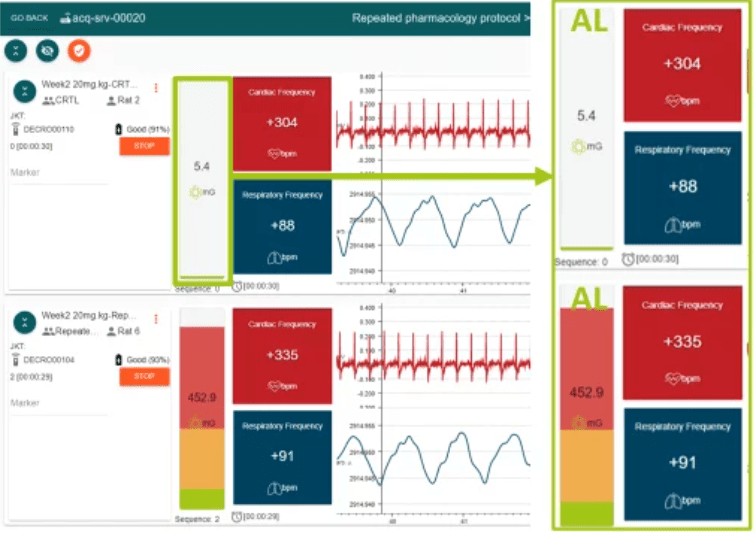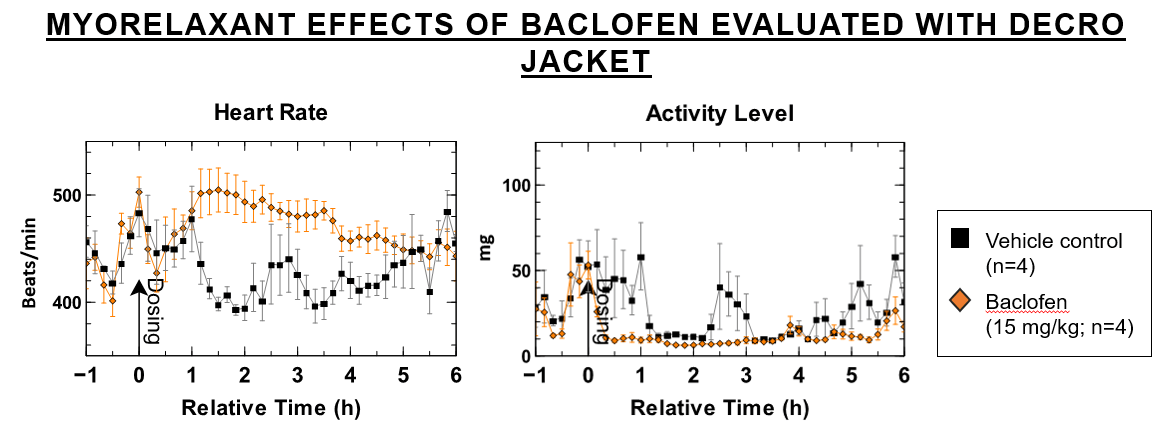Tracking a Subject’s Spontaneous Activity: What are we actually measuring with the DECRO® solution?

The follow-up of the spontaneous activity of a subject in addition to parameters reflecting its physiological parameters is of a high level of interest in multiple cases of use / studies.
This article will allow you to better understand what the DECRO solution can bring you on the measurement of activity in addition to cardiorespiratory monitoring signals in small mammals.
Indeed, DECRO makes it possible to evaluate a level of activity of the equipped animals thanks to the measurement of the forces of acceleration created by the movements of the animal. The measured parameter enriches analyzes in many areas, such as:
- Contextualize an effect. For example, determining whether an increase in heart rate is related to animal excitement or to the effect of an administered compound (Baudet et al. 2021; Clavier et al. 2021).
- Evaluate changes in spontaneous activity or chronobiological cycles of animals by analyzing periods of activity or inactivity according to defined thresholds.
- Allow to evaluate the caloric expenditure related to the activity (estimated parameter: AEE for Activity Energy Expenditure) (Gleiss et al. 2011) , using accelerometry, known to be a proxy for energy expenditure.
- Filter and exclude/select particular data based on animal activity levels.
How is this parameter obtained and what does it actually evaluate?
To be able to move and perform tasks, an individual converts its chemical energy (eg: ATP) into mechanical work through muscle conduction (Bouten et al. 1994) . It is this muscular work which is at the origin of the movements of the body and therefore of the dynamic acceleration forces which result therefrom. These acceleration forces are expressed in mg (1g = 9.81 ms -2 in SI). These forces are recorded by the external attachment of a triaxial accelerometer (Gleiss et al. 2011) located in the transmitter, on the animal’s back.
The force of acceleration ![]() applied to the body of the animal breaks down into:
applied to the body of the animal breaks down into:
- A static acceleration component
 , which is the result of Earth’s gravitational pull and has a cross product of 1 g (9.81 ms -2)
, which is the result of Earth’s gravitational pull and has a cross product of 1 g (9.81 ms -2) - A dynamic component
 , which results from the movement of animals and varies in magnitude depending on the movement perceived by the sensor (Shepard et al. 2008) .
, which results from the movement of animals and varies in magnitude depending on the movement perceived by the sensor (Shepard et al. 2008) .
The activity level defined only exploits the dynamic component of the acceleration ![]() because it is the only one linked to the movement of the animal. The static component
because it is the only one linked to the movement of the animal. The static component ![]() is subtracted from it.
is subtracted from it.![]()
The AL parameter (for Activity Level) corresponds to the sliding average calculated over 1 second of the norm of the total dynamic acceleration force vector. It is expressed in mg.
How does the activity parameter (AL) appear in the DECRO solution?
AL is one of the 3 biosignals provided continuously by the solution, such as heart rate and respiratory rate.
During an acquisition, the manipulator has access to the AL in the form of an “activity gauge” (Figure 1). The level changes at the same time as the animal’s acceleration varies and the value displayed corresponds to the calculated average of this every second.

Figure 1: Software view of the activity gauge during an acquisition (calm animal (top) vs animal that has just made a movement (bottom)).
Depending on the activity level measured in mg, different colors will appear in the gauge. Indeed, the combined observations of several studies carried out in rats have made it possible to define AL levels measured with DECRO, making it possible to quantify different types of activity corresponding to a specific behavioral repertoire described in Figure 2. The different status associated with different levels of activity have been characterized and are presented to you below:

Figure 2: Activity level and associated behavioral repertoire.
What does AL analysis add to a study of cardiorespiratory function monitoring?
1st use case: Support for the contextualization of a pharmacological effect (Baudet et al. 2021; Fares et al. 2022)
Context : Evaluation of baclofen-induced acute cardiorespiratory effects in group-housed rats under experimental conditions similar to those used in regulatory toxicology studies (Baudet et al. 2021).
Material and Methods: 8 rats (male Wistar, 9 weeks old) housed in pairs received a dose of baclofen (15 mg/kg), respiratory depressant) or a dose of a vehicle depending on their group (oral administration). Signals were recorded continuously from 2h before the dose to 6h after the dose.
Results :

Figure 3: Effects of baclofen assessed with DECRO solution 6 hours post- dosing
Conclusion and contribution of AL in this study:
AL levels has made it possible to characterize the muscle relaxant effect of the molecule administered. Indeed, baclofen induced a decrease in spontaneous activity appearing between 30 min and 1 hour after taking the molecule. The animals showed virtually no activity during the 6 hours following administration. At the same time, the molecule induced tachycardia (26% increase in heart rate) extending from 1h45 to 5h after taking it. AL was able to confirm that the tachycardic effect induced by the molecule was not linked to over-excitation of the animal.
This article presented what activity parameter is and how it is measured with DECRO. The pharmacological use case presented shows how the additional information of AL made it possible to understand that the tachycardia was linked to a cardiac pharmacological effect and to exclude an origin linked to animal excitation. This perfectly illustrates the interest of the study of the activity to refine the results obtained thanks to a contextualization of the events observed.
References
Baudet S, Vial J, Ravaz M, Roger V, Bory C, Flenet T. Feasibility of non-Invasive monitoring of Respiratory, ECG and Activity Parameters in Pair-Housed Freely-Moving Adult Male Rats using a Jacketed External Telemetry System (DECRO®) : evaluation of the pharmacological effects of a reference compound. In 2021 Annual Meeting Safety Pharmacology Society, Bruxelles; 2021.
Bouten CV, Westerterp KR, Verduin M, Janssen JD. Assessment of energy expenditure for physical activity using a triaxial accelerometer. Med Sci Sports Exerc. 1994 Dec;26(12):1516–23.
Clavier L, Maffre V, Cambier A, Diop L. Evaluation of respiratory depression induced by fentanyl in rats using the Decro jacketed telemetry. In 2021 Annual Meeting Safety Pharmacology Society, Bruxelles; 2021.
Fares R, Flénet T, Vial J, Ravaz M, Roger V, Bory C, et al. Non Invasive Jacketed Telemetry in Socially-Housed Rats for a Combined Assessment of Respiratory System, Electrocardiogram and Activity Using the Decro System. SSRN Electronic Journal [Internet]. 2022 Apr; Available from: https://ssrn.com/abstract=4064497
Gleiss AC, Wilson RP, Shepard ELC. Making overall dynamic body acceleration work: on the theory of acceleration as a proxy for energy expenditure: Acceleration as a proxy for energy expenditure. Methods in Ecology and Evolution. 2011 Jan;2(1):23–33.
Shepard E, Wilson R, Quintana F, Gómez Laich A, Liebsch N, Albareda D, et al. Identification of animal movement patterns using tri-axial accelerometry. Endang Species Res. 2008 Mar 31;10:47–60.
